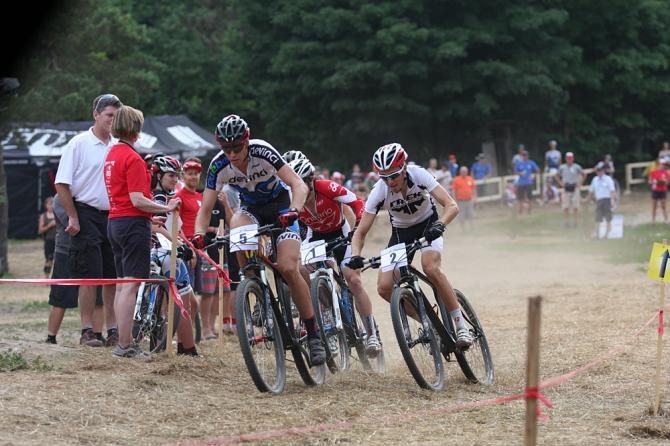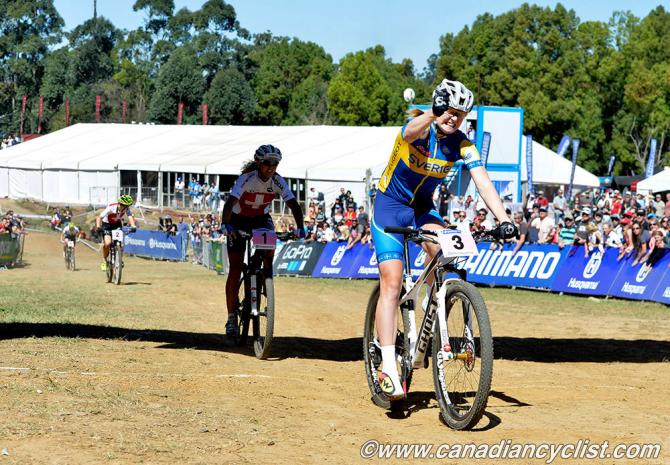Eliminator mountain bike World Cup changes coming
2015 likely to be first year affected



The eliminator, a relatively new sprint-oriented cross country discipline in mountain biking, will likely see some changes in the future, especially with how it is counted within the UCI Mountain Bike World Cup. While plans are in the works to integrate the eliminator World Cup standings with the cross country World Cup standings, those changes are not expected to take effect until the 2015 season.
The birth of the eliminator
The first eliminator world championships was in 2012, and 2013 marked the first year the discipline had its very own World Cup standings. The eliminator came into existence as a way to give World Cup mountain bikers another chance to compete during any given World Cup weekend.
"Three years ago, the teams came to us and asked for us to consider another event in a World Cup weekend," UCI Technical Delegate Simon Burney told Cyclingnews.
"They arrive on a Monday or Tuesday to a World Cup, set up and sit around. They go training and they don't really do anything else. They thought it would be great to have another event in there - great for the riders, the sponsors, the organizers." The extra event - another chance for a good result - would help justify all the expenses of travelling to the World Cups.
The first eliminator at a World Cup was run at the Nove Mesto World Cup in the Czech Republic. "They had a history of having an eliminator before they ever got a World Cup," said Burney. "They asked if they could do one for the World Cup. We agreed. That's how the eliminator first came to be."
Olympic dreams
The latest race content, interviews, features, reviews and expert buying guides, direct to your inbox!
With the first-ever World Cup series for eliminator happening in 2013, the young discipline seemed to be headed to the big time. There was even the possibility of adding it to the 2016 Olympics.
"Last year, the IOC asked the UCI - not the other way around - if we would nominate the eliminator and BMX freestyle to petition for inclusion in Rio Olympic Games [in 2016]," said Burney. "We said, 'Yes absolutely, the more medals the better. Why wouldn't we?'"
"That was a year ago. Then, at the beginning of this year, we still didn't know if the eliminator would get into Rio."
While everyone waited to see whether the eliminator would make the Olympics, there was something else to think about. According to Burney, teams which had initially requested another event on the World Cup weekend, started out as quite supportive of the eliminator... at least for the first few rounds... then their support waned.
"They noticed that a couple of the top riders weren't doing the eliminators. Nino [Schurter] did the first one, then noticed that [Julien] Absalon wasn't doing it, and if Absalon wasn't doing it, he wasn't doing it. Then the Cannondale guys [like Marco Fontana and Manuel Fumic] decided not to do it. One by one, the top guys stopped doing it. We didn't have anything to encourage them to do it.
"We didn't want to make them do it, but we wanted to encourage them to do it. With the Olympic thing in the background, we had a meeting with the UCI elite teams. We go to those 15 teams because the majority of the people who will be at the Olympics are in those teams. We try to get opinions from the pro teams - that's what the World Cups are for. We have a good mechanism for communicating with them."
Burney said the UCI declined to ask the other 110 UCI teams for an opinion because it is a "nightmare" to collect that input. Likewise, the 100-200 federations with which the UCI deals were also not asked for input. "You can't get opinions from everyone," said Burney.
If the eliminator had made it to Rio, the only men and women who would have raced it would have been the cross country riders - those already qualified because no extra spots were going to be allocated for the eliminator. The total number of mountain bikers in the Olympics would have stayed at 50 men and 30 women.
The elite teams and the UCI came to an agreement for a plan on how to evolve the eliminator: "In the first two meetings at the first two World Cups of this year, we decided that if the eliminator made the Olympics, in 2014 for the World Cups, we'd restrict the eliminator to the top 32 men and top 16 women only. Nobody else could do it and the top riders had to do it. The results from it would have determined the gridding for the cross country start," said Burney.
"What we needed was the top 32 guys to be doing the eliminator. The Absalons, the Kulhavys and the Schurters. Those would have been the guys who would have been doing it at the Olympics.
"We agreed to that if the eliminator had gotten into the Olympics, we'd have had 2014, 2015 and 2016 for the top guys to get used to doing the eliminators. It would have been almost like Formula 1 qualification. It would have been something like a show two days before the race, and the top guys would have had to race. It was a nice idea because you could have had someone like Kulhavy, who's not the fastest starter, finish 26th or 27th in the eliminator and that would have put him on the third or fourth row. It would have made the racing really interesting. Maybe somebody like Fumic would have made it to the first row start in the cross country? That also could have made some interesting racing at the start of the cross country."
Olympic dreams crushed
However, in July the UCI found out that the IOC was not going to add any other events to the programme in Rio. It was time to go back to the drawing board and re-consider. The teams met up again at the Vallnord World Cup at the end of July.
"We went back to the teams and asked, 'Do you want to leave the eliminator as it is or think about it again?'" said Burney.
The teams were asked to pick one of four options: 1) Drop the eliminator from the World Cups; 2) Leave the eliminator as it was going to be in the Olympics, with the top 32 riders only; 3) Status quo - no changes from 2013 eliminator format as stand-alone World Cup event; 4) Do something else altogether, such as short track.
Elite team representative Bart Brentjens was picked to collect all the feedback, which showed that teams wanted to leave the eliminator as-is, but link it to the points for the cross country World Cup so that it would be almost a disadvantage if the top guys don't race the eliminator because they wouldn't be getting enough points overall for the World Cup.
"A lot of the teams were into the short track idea, but the majority wanted to keep going with the eliminator," said Burney of the popular American format of short-distance cross country racing. "Short track would have been a 20-25 minute race, one for the guys and one for the women. It would have been nice and compact, too."
"Unfortunately the input on the eliminator came in August, and it was too late to make a rule change for 2014," said Burney. "The Management Board needed the proposal before a certain date."
That means there will be no changes for 2014. The eliminator World Cup will continue to be run as a separate discipline, at each individual round and in the overall standings.
"Anybody can do it. The specialists like [Daniel] Federspiel or [Paul] Van der Ploeg can do their thing. Then during the winter and early next year, we'll figure out a way to incorporate it into the cross country World Cup and encourage the good cross country guys to do it," said Burney.
"There will eventually be no more separate eliminator World Cup classification although specialists will still be able to win individual World Cup rounds."
This year, eliminators were run at most, but not all World Cup rounds. The intention is to run them at all the World Cup rounds in 2014. Eliminators will also remain on the schedule for the Thursday of each World Cup weekend since Burney says that with more triple World Cups on next year's schedule, it's not really possible to fit the eliminators in after the cross countries in the way that is done at the Worlds.
"We have to keep Sunday for the downhill. There's no time on the schedule that day," said Burney. "It's better to keep the eliminator on a Thursday when it's an introduction to the World Cup weekend. If there are spectators, it's great, but if not, we still have the TV coverage."
The UCI may make a minor tweak to Thursday's eliminator schedule for 2014 and run qualifying in the morning instead of in the afternoon. That would let riders who do not qualify know that they can train on the cross country course that day while riders who did qualify for the eliminator finals could rest up and save themselves for the finals.
"Qualification only takes 30 minutes. They can get it out of the way and then have the rest of the day. We'd start the eliminator at 6:00 pm and it would take about an hour and a half for finals."
Sue George is an editor at Cyclingnews. She coordinates all of the site's mountain bike race coverage and assists with the road, 'cross and track coverage.